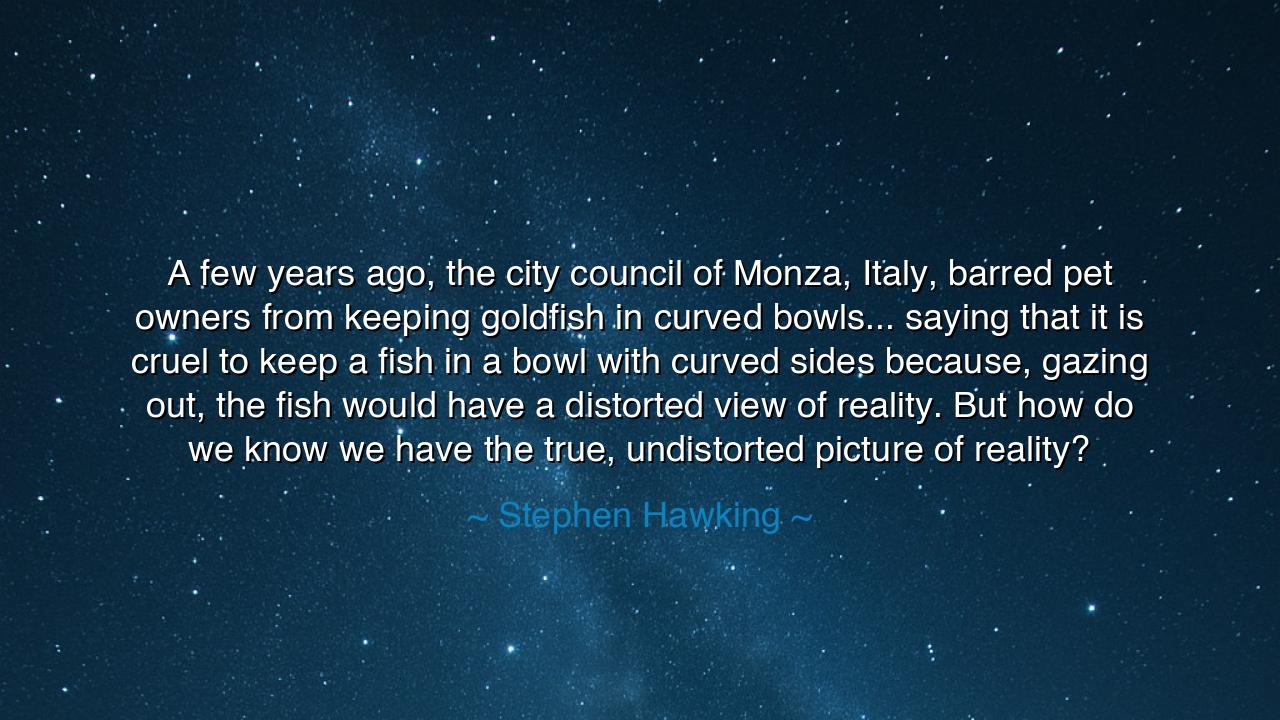
A few years ago, the city council of Monza, Italy, barred pet
A few years ago, the city council of Monza, Italy, barred pet owners from keeping goldfish in curved bowls... saying that it is cruel to keep a fish in a bowl with curved sides because, gazing out, the fish would have a distorted view of reality. But how do we know we have the true, undistorted picture of reality?






Stephen Hawking, voyager of the cosmos and seeker of hidden truths, once shared a reflection both strange and profound: “A few years ago, the city council of Monza, Italy, barred pet owners from keeping goldfish in curved bowls... saying that it is cruel to keep a fish in a bowl with curved sides because, gazing out, the fish would have a distorted view of reality. But how do we know we have the true, undistorted picture of reality?” With this tale, clothed in humor yet burning with philosophy, he reminds us of the fragility of perception, the limits of the human mind, and the eternal question of what is truly real.
At first, his words seem to belong only to the goldfish, trapped within its curved bowl, its world bent and twisted by the arc of glass. Yet Hawking, like the philosophers of old, turns the mirror back upon us. Are we not, too, gazing through unseen bowls, our vision bent by the limits of our senses, our understanding warped by the boundaries of culture, language, and thought? Just as the fish cannot know that its world is distorted, so we, perhaps, cannot know that our vision of the universe is incomplete.
The ancients pondered the same mystery. Plato, in his allegory of the Cave, spoke of men chained in darkness, seeing only shadows cast upon a wall, believing them to be reality. When one prisoner escaped and saw the sunlit world beyond, the truth shattered his old understanding. So too does Hawking’s tale of the goldfish echo Plato’s lesson: our eyes may deceive, our minds may mistake shadows for truth, and what we call reality may be but a dim reflection of a greater, hidden order.
History offers yet another testimony in the voyage of Galileo. He raised a telescope to the heavens and saw moons circling Jupiter, craters upon the face of the moon, and countless stars unseen by the naked eye. The people of his time, gazing through their unaided senses, believed the heavens to be perfect, smooth, and unchanging. To them, his revelations seemed distorted, heretical. Yet it was they, not he, who dwelt within a curved bowl of limited vision. His courage broke the glass, widening humanity’s view of the cosmos.
From Hawking’s reflection comes also a call to humility. If even the wisest among us cannot know whether we see the undistorted picture of reality, then let us walk gently, not with arrogance, but with wonder. For to claim certainty is to risk blindness, but to admit uncertainty is to open the door to discovery. The wise do not cling to their bowls as prisons, but question them, test them, and, when possible, break free into greater understanding.
The lesson for us is clear: never assume that what you see is all there is. Question appearances. Seek perspectives beyond your own. Read, explore, listen to voices unlike yours. The bowl of human perception may never be shattered entirely, but with each act of inquiry, with each brave step beyond comfort, the curve flattens a little, and the vision widens. To grow is not to cling to certainty, but to embrace the mystery with courage and curiosity.
Therefore, let Hawking’s parable guide your heart. Remember the goldfish, staring through curved glass, believing its warped vision to be the whole of existence. Ask yourself each day: am I too staring through a bowl of distortion? Then live as the philosophers, the seekers, the explorers did—always questioning, always reaching, always humble before the vastness of what lies beyond. For though we may never see the perfect truth, in the striving itself we become greater, and in the humility of our seeking, we come closer to the eternal light.






AAdministratorAdministrator
Welcome, honored guests. Please leave a comment, we will respond soon